Leaders: Top 5 Books for Your Summer Reading List
Latest Posts
- 2024 Reading List for Leaders
(posted: 07/01/2024)The right book can be a leadership game-changer.
- Coach's Notebook: Exec Presence for Leaders
(posted: 05/08/2024)As a leader your charisma is critical. Learn how to develop it!
- New Year's Resolutions vs New Chapters
(posted: 02/01/2024)Forget New Year's...Your new chapter can begin when you are ready!
Blog Archives
Kristi posts to her site about once a month, but frequently more often. She also appears as a featured contributer on select other sites. If you would like to be notified when new blogs are posted, please subscribe to our newsletter.
If you are interested in Kristi guest posting to your site feel free to contact us.
Leaders: Top 5 Books for Your Summer Reading List
(posted: June 6th, 2016)

In my experience, successful leaders are also avid readers.
Lots of people use summer to catch up on their beach reading, but the best leaders grab the opportunity to read some juicy, challenging, motivating or inspiring books.
Not articles, or blogs... books.
In the summer, since business gets quieter, clients and colleagues go on vacation and your schedule lightens up, there is more time to dive deep and really absorb full-length books.
And it's not just me - experts agree that successful people read. From a recent Harvard Business Review article,
"...deep, broad reading habits are often a defining characteristic of our greatest leaders and can catalyze insight, innovation, empathy, and personal effectiveness."
Are you ready to use your reading time this summer to get a jump on the competition, and brush up on your leadership skills and personal growth? Then take a look at a list of my current favorites.
It may be summer, but we are all still busy, so I've kept it to just five books.
Leaders: Top 5 Books for Your Summer Reading List
1) Presence: Bringing Your Boldest Self to Your Biggest Challenges, by Amy Cuddy
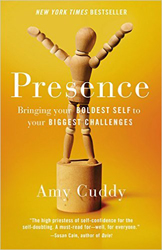
What it's about: Have you ever found yourself on the spot, in a nerve-wracking situation, and choked? I have, and Amy Cuddy has, too. Cuddy is known around the world for her 2012 TED talk about "power poses"; it's the second most-viewed talk in TED's history. She points out in her new book, Presence, "Too often we approach our lives' biggest hurdles with dread, execute them with anxiety, and leave them with regret." She demystifies executive presence (hint: it's all about being your genuine and confident self) and reveals that we can cultivate our own presence moment by moment, day by day, through tweaks to our body language, behavior and mind set.
What you'll learn: Cuddy includes stories of her own and other's experiences learning to go from fear to flourishing in stressful moments, which help illustrate her points and remind us that anyone can cultivate presence. She says that presence rests on the following three pillars:
- How you act (gravitas or authority)
- How you speak (communication)
- How you look (appearance)
I found the book full of great insights and tips backed by science, but Brene Brown said it best, "She shows us how bringing our boldest, most authentic selves to challenging situations inspires others to do the same. This book is a game changer."
2) TED Talks: The Official TED Guide to Public Speaking, by Chris Anderson
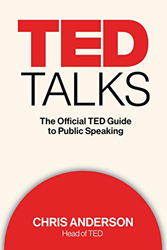
What it's about: How the miracle of powerful public speaking is achieved, written by no less than the head of TED, with insight on how to do it yourself. The central thesis here is that anyone who has an idea worth sharing (the TED tagline) is capable of giving a powerful talk.
What you'll learn: A speaker's mission is to take something that matters deeply to them and rebuild it inside the minds of their listeners. In this book, Anderson gives lots of suggestions and tools to improve your speaking. I really love that he touches on the right way and the wrong way to prepare.
He makes the case that public speaking skills will be increasingly important in the future, and that we need to spend a lot more time learning from each other. These are skills that will benefit a wide range of people, including new graduates starting their careers, and anyone who wants to progress at work, who cares about an issue, who wants to build a reputation, or leave a legacy, anyone who wants to connect with others who share a passion. So really, anyone.
When you can explain your unique insight, or work, or passion in a way that we can understand, in ordinary layman's terms, when you can convince us of why it matters and why you are passionate about it, then you will expand our world view.
This truly is a must-read for anyone who is ready to create impact with their ideas and give powerful, influential presentations every time.
3) The Ideal Team Player: How to Recognize and Cultivate The Three Essential Virtues, by Patrick Lencioni
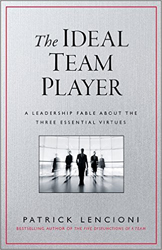
I'm a big fan of Patrick Lencioni's work, and use all his books in my work with clients.
What it's about: It's so important to have people working for you who fit with your culture, yet leaders tend to hire primarily for competency and technical skills, probably because they are more straight forward and easier to identify. In this book, Patrick Lencioni uses his classic storytelling technique to identify the three indispensable virtues of ideal team members, and offers a framework and tools for identifying, hiring, and developing them.
What you'll learn: Lencioni says the three virtues you want in your team members are humility, hunger and people smarts.
- Humility is the single greatest and most indispensable attribute of being a team player.
- Hungry people almost never have to be pushed by a manager to work harder because they are self-motivated and diligent.
- Smart refers to a person's ability to read and understand others.
He also presents a powerful framework and easy-to-use tools for identifying, hiring and developing ideal team players in any kind of organization.
I loved that he connects the ideal team player model with the Five Dysfunctions of a Team. Lencioni shares that when team members possess significant humility, hunger and people smarts, they enable teamwork by making it easier for members to overcome the five dysfunctions of a team. That means they will be more likely to be vulnerable and build trust, engage in productive, if sometimes uncomfortable, conflict with team members, commit to group decisions even if they initially disagree, hold their peers accountable when they see performance gaps and put the results of the team ahead of their own needs.
4) Creativity, Inc.: Overcoming the Unseen Forces That Stand in the Way of True Inspiration, by Ed Catmull
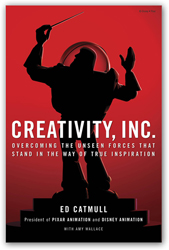
What it's about: Ed Catmull is the co-founder (with Steve Jobs and John Lasseter) and president of Pixar Animation Studios. Think, Inside Out, the Toy Story movies, and The Incredibles. At Pixar he has created and maintained a very unique environment that I believe defies convention. In the book he explores creativity in business and in leadership, taking us inside the heart of Pixar and showing us how to build a creative culture.
What you'll learn: A creative culture isn't just for organizations that pursue artistic endeavors. The ideas here can help you build great teams, lead your employees to new heights, and develop original solutions.
Catmull is all about team work and great culture, but at Pixar they toss much of the conventional wisdom out the window and get into it with both feet. Everyone can, and is expected to, talk to anybody. Failure is not just accepted, it is courted. Managers are expected to not know everything and to "...accept risk; they must trust the people they work with and strive to clear the path for them; and always, they must pay attention to and engage with anything that creates fear. Successful leaders must embrace the reality that their models may be wrong or incomplete."
No matter what kind of work you do, this book will challenge you to rethink your methods and your culture, and I'd love to hear how you might use a Pixar tactic in your own organization.
5) 10% Happier: How I Tamed the Voice in My Head, Reduced Stress Without Losing My Edge, and Found Self-Help That Actually Works--A True Story, by Dan Harris
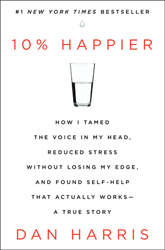
What it's about: Is the voice in your head a jerk? Mine is, and so is Dan Harris'. The co-anchor of Nightline and the weekend Good Morning America, Harris is smart, funny and skeptical about anything "New Age-y". His book takes you along on his strange adventure, from his nationally-televised panic attack to his journey through the weird world of alternative spirituallity, and finally into meditation. It's a great read, from a master storyteller, and it also provides a real starting point for skeptical, impatient, driven types (me, you?) to try meditation.
What you'll learn: Perhaps one of the greatest things about Harris' book is that if he can meditate, anyone can. By now we've all see the research on how meditation can help us to be more successful, in our businesses as well as in our personal lives, but many of us still think that it's "not for us" or that we simply can't do it. Harris takes us inside his mind and shares his thoughts and behaviors, not from a desire to be on stage, but to let us see that we are not alone. He too is driven, ambitious and practical, yet he finds that he can meditate, and that it does improve his life, his relationships, and his decision-making. The book title, 10% Happier, is a reference to Harris' estimate of how much mediation has changed him. He's quite clear that meditation is not a miracle cure. Yes, meditation sounds weird at first, and yes, it is hard. In fact, one of the a-hah's here is that meditation doesn't necessarily get easier, that your mind will wander, you will struggle to focus, that is the practice, and it is worth it.
For those of you who want to try it, I highly recommend trying Headspace. It gives you some guidance and structure and lets you try different kinds of meditations.
Summer Reading for Personal Development
Even if you only read one book off the list, I know that you will find yourself energized, inspired and ready to conquor your world! Of course, if you are hungry for more great leadership reads, drop me a line. I have many more suggestions and I am always thrilled to share.
Some other possibilities to round out your list might include timeless works such as biographies of historical leaders and sports figures, general history, or those literary classics you've been meaning to get to.
- Have you read any of the books on my list? If so, what were your key takeaways or a-hah's?
- What title would you add to the list?
- How do you incorporate creativity and/or meditation into your leadership?
Have you read the Secrets of Great Presentations Series?
- Part 1 - Understanding Your Audience in 5 Steps
- Part 2 - Secrets of Great Presentations: 6 Ways to Structure a Compelling Talk
- Part 3 - Secrets of Great Presentations, Storytelling: Why Tell Stories?
- Part 4 - Secrets of Great Presentations, Storytelling: Where to Find Stories
- Part 5 - Secrets of Great Presentations, Storytelling: How to Tell a Story
Sign Up for our newsletter and never miss another post.
